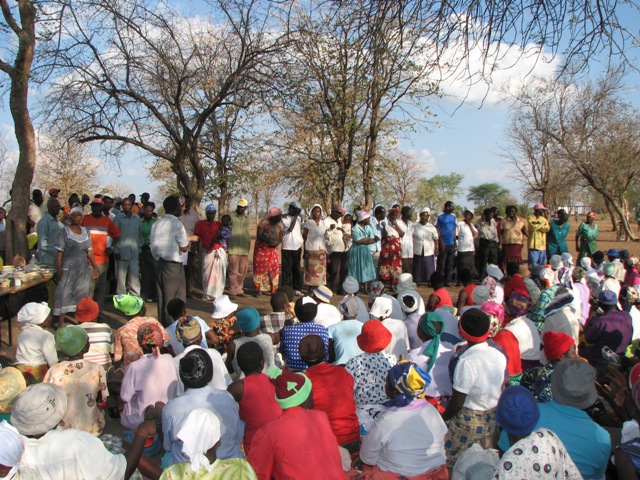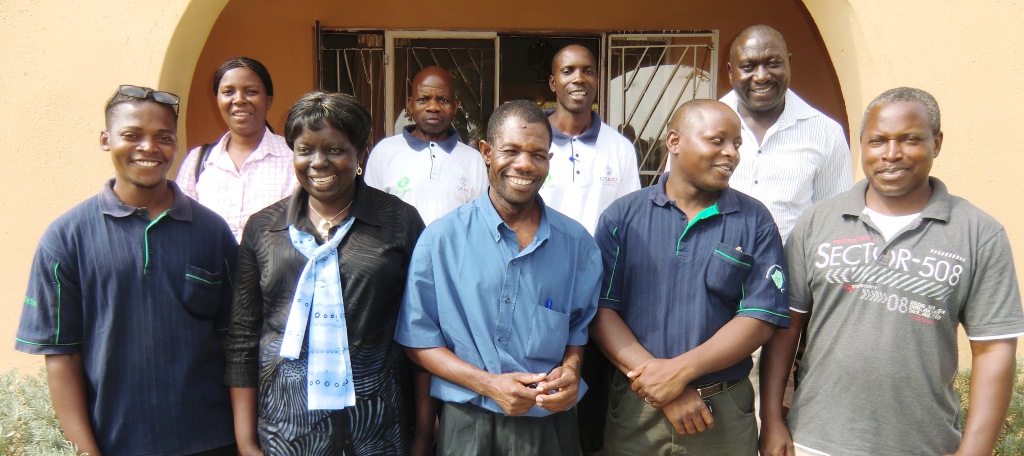Full layout can be downloaded in four parts (20 pages in total) … Please be patient, it takes a bit of time!
Meanwhile please read the excerps…
2011 AHEAD Annual Report_part_1
2011 AHEAD Annual Report_part_2
2011 AHEAD Annual Report_part_3
2011 AHEAD Annual Report_part_4
EXCERPS:
 ZIMBABWE AHEAD, 2011
ZIMBABWE AHEAD, 2011
Anthony Waterkeyn, Chairman
The year ended very sadly with the passing away of Josephine Mutandiro on 27th December, 2011. She was a founding staff member who on retirement in 2009 became a Board Member and Trustee. She will be sorely missed but very fondly remembered by all those of us who have been privileged to work with her and who have greatly appreciated her deep humanity, wisdom and wonderfully innovative understanding of grass-root community development.
ZimAHEAD has continued to play an ever increasing role in the WASH sector, not only in Zimbabwe, but also in the region at large. During the well attended SADC WASH Conference that took place in Maputo in May this year, the final recommendation sent forward to the AfricaSan Conference in Rwanda (July 2011) highlighted the effectiveness and impact that CHCs achieve in cost-effective hygiene behaviour change. This has stimulated increasing interest from various NGOs in the region to find out more about CHCs.
To-date, 22 NGOs in Zimbabwe have been trained and mentored by Zim AHEAD as part of the Protracted Relief Programme 11, funded by DFID.
Click here for Map of PRP Districts 2011
Requests from various NGOs in the region have been received to provide Look andlearn tours to Zimbabwe. This once again highlights the urgent need for establishing a regional Research & Training Centre to enable international visitors to study CHCs in action and provide them with the quality of training that will enable them to replicate and scale up CHCs back in their own countries. It will also provide an opportunity for students to research the cost effectiveness of CHCs and such research, if it generates objective evidence of success, should in turn increase the prospects for ZimAHEAD to extend our influence. All this should bode well for future funding and overall growth prospects for ZimAHEAD.
In 2012 we expect to attract direct support from leading agencies rather than simply being sub-contracted through international NGOs as has been the case over recent years. This should allow us to grow and expand as an organisation in the near future in stark contrast to the many challenges we faced through the latter-half of 2011 as a result of delayed start of projects and funding constraints. With the EUWF/ACF project finally starting and good prospects of direct USAID funding, the outlook for 2012 is definitely a bright one!
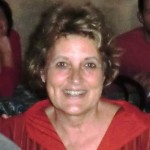 ANNUAL REPORT BY EXECUTIVE DIRECTOR
ANNUAL REPORT BY EXECUTIVE DIRECTOR
Dr. Juliet Waterkeyn
2011 started out with great promise. Zimbabwe AHEAD had consolidated its reputation with government as an innovative leader in the sector, contributing to the national effort in WASH and SAG networks, as well as spear-heading the development of new Health Promoting Schools Curriculum. We were also considered a strategic local partner by many international NGOs wanting to use the CHC methodology as it spread throughout the country thanks largely to our role in Protracted Relief Programme (PRP II), where we had trained 22 NGOs in our methodology. Through our sister Association, Africa AHEAD, we were invited to provide community mobilization in massive engineering contracts by prestigious UK firms, who were bidding for rehabilitation of sanitation in 5 towns in Zimbabwe. By the end of 2010, eight international partners had submitted joint proposals with us for EC Funding and in early 2011 we were delighted to hear the ACF bid was successful. Our team was gearing up to begin this ambitious programme starting 450 CHCs in Gutu and Mberengwa districts. Although we expected to start in May, delays ensued while ACF worked through their own bureaucratic demands from the EU, and ZimAHEAD was left hanging. As our project with OXFAM wound up in mid year, and the ACF programme still showed no signs of start up in July, many field staff were laid off , while others were on half salaries for the rest of the year.
The second half of 2011 taxed our small NGO to near breaking point. As the political situation in Zimbabwe remained locked in stale-mate, we, like many other NGOs this year, found direct funding elusive. To minimize core costs, Regis Matimati, our Director of Programmes has stood in for me as Acting Director most of the year and continued valiantly to keep up morale despite the many challenges, whilst Innocent Marivo, our Admin and Finance Manager patiently kept us in business, with sale of training materials and consultancy training workshops for Medair and PRP II. I would like to recognize the loyalty of our staff, who have all come back to the Zim AHEAD family ready to work again now the ACF project is finally going ahead. We are happy to announce that in January 2012 we are taking on 9 new staff for the ACF Programme, and another 8 new staff for the emergency USAID-OFDA that we expect to start up soon. This will enable Zim AHEAD to go back to our old project areas of Makoni District, Chiredzi and Masvingo, training 240 CHCs with 216,000 beneficiaries in one year. 2012 should be a record breaking year for us as we continue to scale up CHCs throughout Zimbabwe. May this happen as planned!
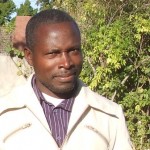 COLLABORATION AND ADVOCACY
COLLABORATION AND ADVOCACY
Regis Matimati, Director of Programmes
ZimAHEAD maintained its position in working on the National WASH Strategic Advisory Group (SAG) where we presided and deliberated over national WASH issues and gave recommendations and advice to the National WASH steering committee.
Monthly we attended the national WASH cluster in Harare and a couple of times we attended the Masvingo Provincial WASH cluster as we had projects going in the province. The several meetings we had in the Education cluster may involve us a school health project in collaboration with VVOB and UNICEF.
We worked and contributed on the MoHCW Community Based Environmental Health Promotion Programme (CBEHPP) and we were invited to make presentations and be discussants on CHCs at a 2 day National Environmental Health Officers’ forum in Nyanga which we attended together with the ZA Board Chairman.
We joined the NCU led National Sanitation and Hygiene taskforce that came up with the National Sanitation Strategy. We met and deliberated for over 8 months to come up with the document. Due to representations we made at such meetings, CHCs feature in the Strategic document as the way to go for Zimbabwe.
We have been assigned by National WASH cluster to lead the engagement of partners on Urban PHP and to that effect we have presented at the Urban Rehab Technical Working group and the National WASH cluster. A lot of interest has been generated and other organizations are wanting to learn from us about urban PHP picking from our Mutare, Chiredzi and Masvingo urban experiences.
We have been invited to several National forums on the WASH and Education front such as the Regional WASH in School workshop which was attended by representatives from South Africa, Namibia, Botswana, Zambia, Kenya, Malawi and Zimbabwe MoEASC and the National NAC planning and review workshops and that signifies how we are perceived by our significant partners in the sector namely NCU and Unicef who invited us.
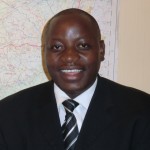 WORKER OF THE YEAR: 2011:
WORKER OF THE YEAR: 2011:
Admin and Finance Manager: Innocent Marivo
We would like to recognize the good work of Innocent Marivo, our Administration and Finance Manager, who has kept his cool through thick and thin and managed to show all our donors that no matter how small or large the budget, our systems are in place and our books are squeaky clean.
Innocent took over the accounts in 2007, at the time of hyper-inflation, when the dollar had been in free fall and accountants throughout Zimbabwe were despairing of being able to balancing their books, with the number of zero’s they had to juggle with, and which changed as they were doing the sums. Methodically he went through the previous years, redoing them to meet the exacting standards of Mercy Corps, and passed all compliance tests, whilst setting up systems that have impressed other partners like Oxfam and ACF. In 2010, we had our books audited and they measured up to the international standards which enable us to apply for direct funding from the likes of USAID. Most impressive of all is how he has managed to stretch the limited income this year, prioritizing expenditure and making careful decisions that have enabled us to stay in business through the sale of training materials and consultancy work. At the same time he was able to complete his Masters degree in Accounts! Thank you Innocent and congratulations!
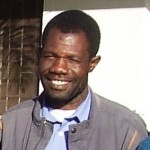 MASVINGO BOREHOLE REHABILITATION
MASVINGO BOREHOLE REHABILITATION
Andrew Muringaniza, Programme Manager
Thanks to OXFAM, which based on our past performance gave ZimAHEAD the chance to demonstrate its ability to implement hardware projects in addition to our usual software role.
In total 82 Water User Committee members and 15 Village Pump Mechanics were trained and in total, 15 boreholes were rehabilitated.
An extra 7 boreholes above the target of 8 boreholes were rehabilitated. This was achieved by making it mandatory for each VPM to successfully rehabilitate a borehole in order to qualify for a certificate!
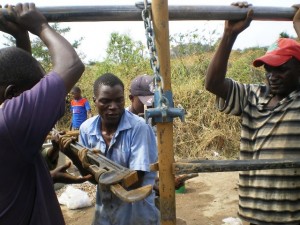 There were 121 CHC with 5,400 CHC members. The size of CHC was smaller than our customary target of 100 per club due to partner’s proposal which limited CHCs to an average of 45 members, which was well below demand.
There were 121 CHC with 5,400 CHC members. The size of CHC was smaller than our customary target of 100 per club due to partner’s proposal which limited CHCs to an average of 45 members, which was well below demand.
The project also pioneered the involvement of local business community in providing soap to identified beneficiaries using a voucher system. The shops were paid upon completion of distributing 10,000 bars of soap. Health knowledge and good hygiene practice increased from a baseline of 40% to 80%, exceeding the project target of 75%.
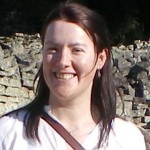 TOUR OF PROGRAMMES:
TOUR OF PROGRAMMES:
Kate Brogan (2011 Intern)
On completion of my Masters Degree in Water and Sanitation, from Cranfield University, ZimAHEAD (the Zimbabwean arm of Africa AHEAD) kindly agreed to accept me as an intern to enable me to see first-hand how this approach is achieving sustainable development through the creation of a Health Community Club, the vehicle for change. Travelling with Acting Director, Mr Regis Matimati, to do a follow-up visit on some of the projects, I was able to see how the Community Health Clubs are faring.
Our first stop was the town of Masvingo where a project had been carried out from July to November 2010 in an area called Garikai. This is a high density area that was formed after ‘Operation Murambatsvina’ to rehouse some of the displaced people that were affected. Houses consist of two rooms and have no water or sanitation facilities. As many as two families can reside in one dwelling, as the number of houses built is not nearly enough for all those made homeless.
While driving through Garikai I am struck by how clean it is. Gardens are found surrounding every home, with tippy taps suspended on structures outside each. No litter is to be seen anywhere and rubbish pits have been dug to burn any rubbish that does need disposing of. As our car drives along the narrow dirt road through Garikai we are greeted with broad smiles and ladies coming up to the vehicle to greet Mr Matimati. They vigorously shake his hand and proudly tell him how clean their house it. They say that their life has now been transformed as they now know how to keep their house and area clean and free from illness.
The close proximity of houses and fact that these people are only renting their homes means that the building of latrines is not a simple matter for them; however they are proud to advise that now they practice ‘Cat Sanitation’ ensuring a clean environment is maintained. To see such respect and appreciation for the education provided here was very moving, and showed that behavioural changes can be achieved in a short amount of time and in difficult circumstances if the approach taken is participatory.
The following day we travelled to the rural areas of Masvingo to visit a project that is still running where we heard testimonies from members about how their life had changed as a result of the club. The support within the group for all its members is obvious, and through this support the people appear to feel encouraged to continue their home improvements.
One lady stood up and told us how she would carry out all her daily duties and never once wash her hands. Then she would prepare the meals and serve them to her family with dirty hands. Now she knows this is not good, and washes her hands regularly and cleans her house daily. Another lady then stood to verify that the testimony was true. She said she had known this lady for years and that she used to be very dirty, to which they all laughed in agreement. They applauded the changes she has made her family is proud of their home -positive peer pressure!
When leaving we were begged by some members to visit their homes. Kitchens have been beautified with shelving moulded into the clay walls and a clay fuel efficient stove are the fashion contributing to the greening of the area, as less firewood is used and valuable time is saved.
 Our next visit was to a School Health Club in ward 27 of Masvingo Rural. The headmistress guided us around the school grounds were a tippy tap was to be found outside each classroom as well as outside the latrines. She advised that now the books are lasting longer as the children are keeping them clean and that it is the responsibility of the teacher and pupils within each class to ensure soap and water are kept at the tippy tap station at all times. The grounds of the school were immaculate and even the teachers homes which are found on the school grounds must now be maintained to a high standard of cleanliness.
Our next visit was to a School Health Club in ward 27 of Masvingo Rural. The headmistress guided us around the school grounds were a tippy tap was to be found outside each classroom as well as outside the latrines. She advised that now the books are lasting longer as the children are keeping them clean and that it is the responsibility of the teacher and pupils within each class to ensure soap and water are kept at the tippy tap station at all times. The grounds of the school were immaculate and even the teachers homes which are found on the school grounds must now be maintained to a high standard of cleanliness.
The children all gathered under trees in the school grounds and proceeded to sing songs and recite poems they had written in thanks for Zim AHEAD’s project.
The school mistress said that the borehole that had been rehabilitated on the school grounds will never break again, as she now has the skills to repair it herself. She feels she is now as good as any village pump mechanic!
Key Staff 2011

